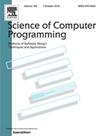TSC2CARLA: An abstract scenario-based verification toolchain for automated driving systems
IF 1.4
4区 计算机科学
Q3 COMPUTER SCIENCE, SOFTWARE ENGINEERING
引用次数: 0
Abstract
Transitioning automated driving systems to complex operational domains disproportionally increases demands on verification activities. In the worst case, the operational domain can not be covered by a manageable set of logical scenarios. An anticipated solution is to use abstract scenarios, which increase coverage while still enabling formal methods. However, established verification approaches must be adapted for abstract scenarios. In this work, we consider the generation of simulatable test suites from abstract scenarios. For this, we use Traffic Sequence Charts (TSCs), a visual yet formal scenario description language based on first order logic. We propose an SMT-based process for generating concrete test cases that can be simulated in e.g. CARLA. This theoretical framework is compiled into an architecture and a prototypical implementation called TSC2CARLA. An evaluation on a set of non-trivial examples yields initial evidence for the feasibility of our approach.
TSC2CARLA:用于自动驾驶系统的基于场景的抽象验证工具链
将自动驾驶系统过渡到复杂的操作领域不成比例地增加了对验证活动的需求。在最坏的情况下,操作域不能被一组可管理的逻辑场景所覆盖。一个预期的解决方案是使用抽象的场景,它增加了覆盖率,同时仍然支持正式的方法。然而,已建立的验证方法必须适应抽象的场景。在这项工作中,我们考虑从抽象场景生成可模拟的测试套件。为此,我们使用流量序列图(tsc),这是一种基于一阶逻辑的可视化而正式的场景描述语言。我们提出了一个基于smt的过程来生成具体的测试用例,这些测试用例可以在例如CARLA中进行模拟。这个理论框架被编译成一个体系结构和一个名为TSC2CARLA的原型实现。对一组非平凡示例的评估为我们的方法的可行性提供了初步证据。
本文章由计算机程序翻译,如有差异,请以英文原文为准。
求助全文
约1分钟内获得全文
求助全文
来源期刊

Science of Computer Programming
工程技术-计算机:软件工程
CiteScore
3.80
自引率
0.00%
发文量
76
审稿时长
67 days
期刊介绍:
Science of Computer Programming is dedicated to the distribution of research results in the areas of software systems development, use and maintenance, including the software aspects of hardware design.
The journal has a wide scope ranging from the many facets of methodological foundations to the details of technical issues andthe aspects of industrial practice.
The subjects of interest to SCP cover the entire spectrum of methods for the entire life cycle of software systems, including
• Requirements, specification, design, validation, verification, coding, testing, maintenance, metrics and renovation of software;
• Design, implementation and evaluation of programming languages;
• Programming environments, development tools, visualisation and animation;
• Management of the development process;
• Human factors in software, software for social interaction, software for social computing;
• Cyber physical systems, and software for the interaction between the physical and the machine;
• Software aspects of infrastructure services, system administration, and network management.
 求助内容:
求助内容: 应助结果提醒方式:
应助结果提醒方式:


